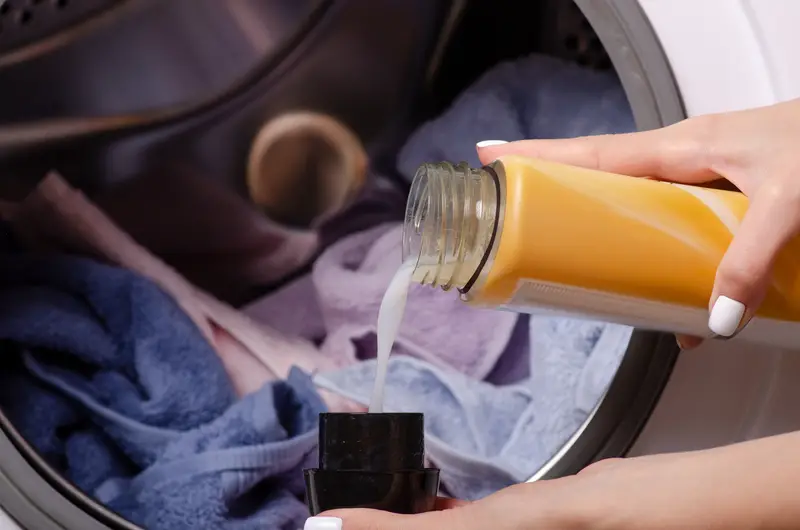Think that bottle of fabric softener is making your laundry better? Think again. While many of us grew up watching those commercials of fluffy towels and soft sheets, the reality is much different. Research shows that fabric softener might be doing more harm than good – to your clothes, your washing machine, and potentially even your health.
The hidden damage to your washing machine

Your washing machine wasn’t designed to handle the waxy buildup that fabric softeners leave behind. This residue accumulates over time, creating the perfect breeding ground for mold and mildew, especially in front-loading machines. What’s worse? This buildup can clog drain lines and significantly reduce your appliance’s lifespan.
Your towels aren’t getting cleaner
Remember that soft, luxurious feeling you love in your towels? It’s actually working against you. The waxy coating from fabric softener reduces the absorption capacity of your towels, making them less effective at drying. The same applies to workout clothes – that coating interferes with moisture-wicking properties, leaving you feeling sweaty and uncomfortable during exercise.
Safety concerns you need to know about

Parents, this one’s crucial: fabric softener can compromise the flame-resistant properties of children’s sleepwear. Plus, those with sensitive skin might experience irritation due to the chemicals and heavy fragrances. What if your child’s safety clothing isn’t providing the protection you think it is? The chemical cocktail in fabric softeners isn’t worth the risk.
Smart alternatives that actually work
The good news? You don’t need fabric softener for fresh, soft laundry. A simple ball of aluminum foil in your dryer can eliminate static cling. For softness, wool dryer balls work wonders. Dealing with hard water? Instead of fabric softener, consider a water softening system for a long-term solution.
Environmental impact matters

Most fabric softeners contain petroleum-based chemicals that aren’t biodegradable. These substances end up in our waterways, harming marine life. For an eco-friendly alternative, try white vinegar in the rinse cycle – it naturally softens clothes and removes odors without leaving harmful residues.
Money-saving benefits of skipping softener
Beyond the environmental and practical benefits, eliminating fabric softener saves money. Those bottles aren’t cheap, and the damage they cause to appliances and clothes leads to premature replacements. Simple alternatives like baking soda or vinegar cost pennies per load and work just as effectively.
Making the switch away from fabric softener might feel strange at first, but your clothes, appliances, and wallet will thank you. Start with small changes – try vinegar in your next load of towels or pop a ball of aluminum foil in the dryer. You might be surprised to find that you don’t miss fabric softener at all. The best part? Your laundry will be truly clean, not just coated in artificial softeners and fragrances.

